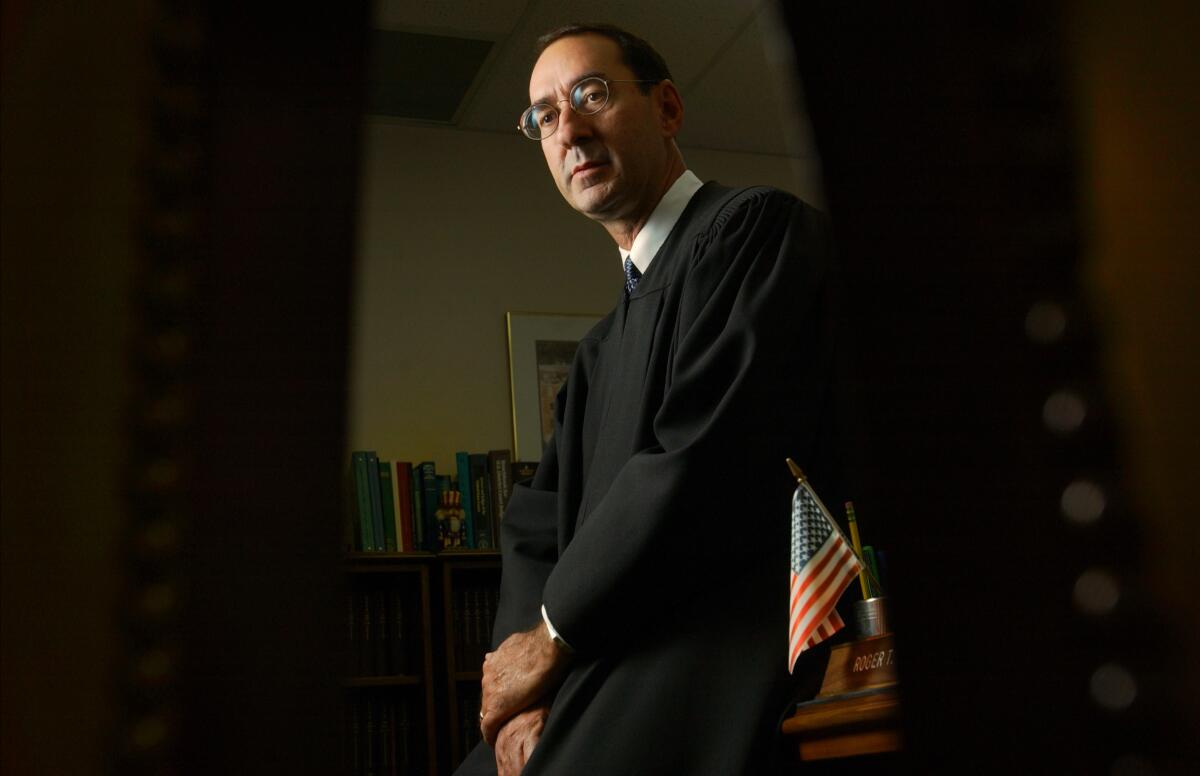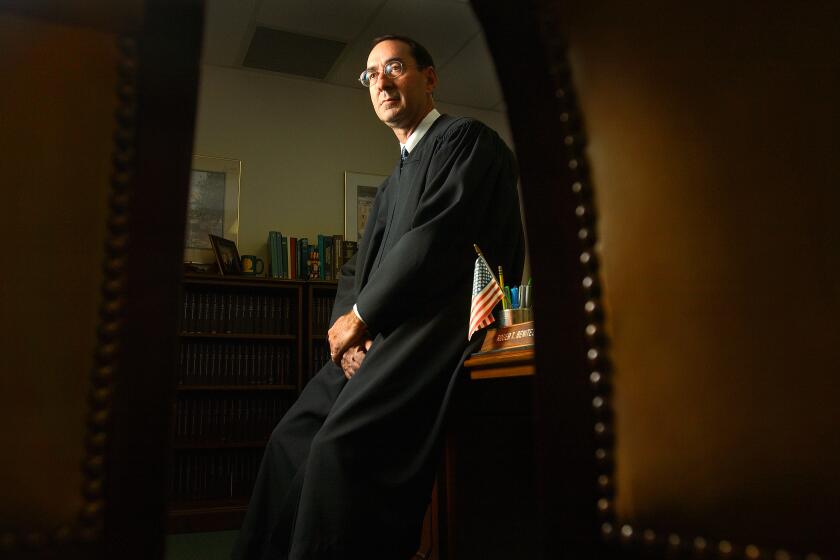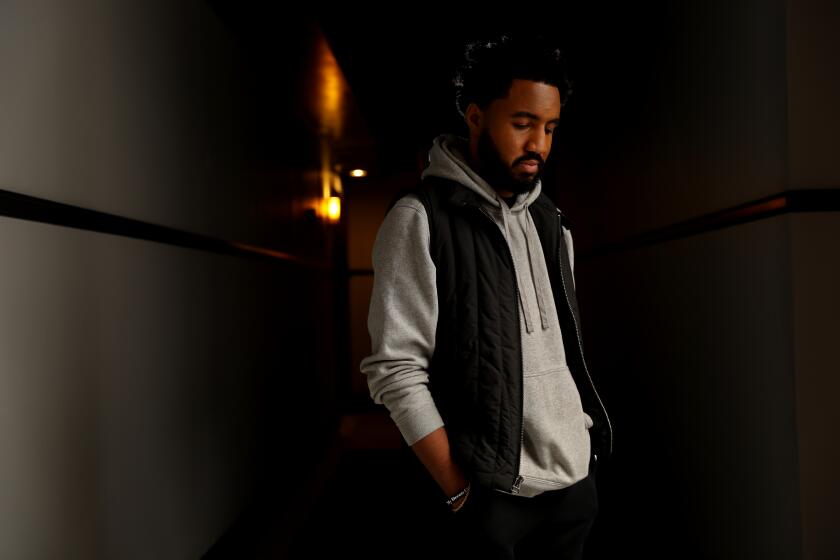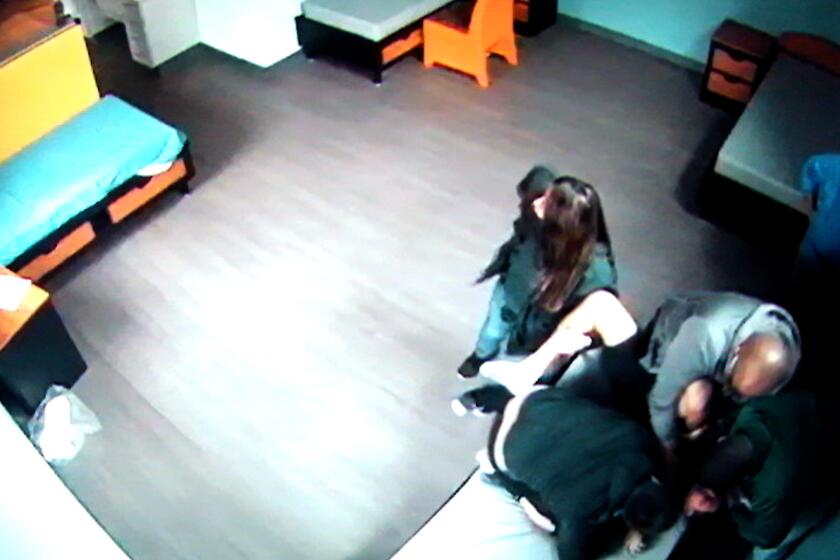San Diego federal judge had defendant’s 13-year-old daughter handcuffed. Now he’s under review

- Share via
A misconduct complaint against San Diego-based U.S. District Judge Roger Benitez, who ordered a U.S. marshal to handcuff a defendant’s 13-year-old daughter during a hearing, will be reviewed by a higher court, the U.S. 9th Circuit Court of Appeals said Tuesday.
The handcuffing exercise, which brought the girl to tears in the courtroom, was intended to scare her away from doing drugs and ending up in court like her father, Benitez explained to her, according to a transcript of the Feb. 13 hearing.
Instead, the father’s defense attorney described the incident in a motion as “psychologically damaging and harmful.”
Four days after the hearing, the chief judge for the Southern District of California, Dana Sabraw, contacted his counterpart at the 9th Circuit “regarding allegations of judicial misconduct” by Benitez, according to a court order confirming the inquiry filed Tuesday.
Now a 9th Circuit judge will review the complaint, conduct an inquiry and decide what action to take, which could include dismissal of the complaint, corrective action levied against Benitez, or the formation of a special committee to further investigate. The initial review will be completed by 9th Circuit Chief Judge Mary Murguia, unless she happens to be disqualified from reviewing a complaint against Benitez, in which case the most senior active judge who is not disqualified would take over.
In an era of fierce polarization, Judge Roger T. Benitez seems a perfect fit, an object of rage and adoration. His likeness as ‘St. Benitez’ — with robes and a halo, sometimes holding an AR-15 or a box of bullets — is plastered on T-shirts, prayer candles and even gun magazines.
Murguia wrote in the order that she publicly disclosed the complaint against Benitez “in order to ‘maintain public confidence in the Judiciary’s ability to redress misconduct or disability.’”
Benitez declined to comment Tuesday through his administrative law clerk, who wrote in an email that the judge “regrets that he is not permitted to comment on matters pending before the court.”
The incident was first made public Monday by the legal blog Above the Law and occurred during a hearing for the girl’s father. He could not be reached for comment Tuesday, and his appointed attorney from Federal Defenders of San Diego did not respond to messages. The executive director of Federal Defenders asked for a list of questions about the incident but did not respond to them Tuesday.
The hearing was held to revoke probation for the girl’s father, following completion of a five-year prison sentence on a drug distribution conspiracy charge and an additional five years of supervised release that was not going well.
According to a transcript of the hearing, Benitez gave the man a chance to address the court before being sentenced back to prison for violating the terms of his probation. The defendant told the judge he grew up in San Diego, which means he’s constantly running into people he knows and falling into prior bad habits.
“It’s a reoccurring cycle. It’s a revolving door,” the defendant said.
Deon Jones’ legal battle to hold the LAPD accountable for wounding him at a 2020 protest has been long and arduous. The city has made it that way.
He said the only way he believed he could turn his life around was by “leaving what I know, leaving everybody I know.” Then he told Benitez his daughter was “following the same footsteps as I am right now.”
The judge interrupted the defendant, asking him what he meant. The man told the judge: “She’s basically growing up where I grew up, so she’s encountering the same people that I grew up with that’s going to lead her into the same path that I went down.”
After some additional arguments about his case, Benitez addressed a U.S. marshal in the room.
“You got cuffs?” he asked the marshal. Then he addressed the defendant’s daughter in the gallery, asked for her name, and then asked her to approach and stand next to her father’s attorney.
“Do me a favor,” Benitez told the marshal. “Put cuffs on her.”
The girl started to cry, according to a filing by the client’s defense attorney, Mayra Lopez.
Benitez then asked the marshal to escort her to the jury box. Lopez wrote that her client’s daughter continued to cry before Benitez released her after a “long pause.” But he did not immediately let her go back to her seat.
A California law barring employers from requiring their employees to resolve workplace complaints in private runs afoul of federal law, a federal court ruled.
“Now, don’t go away,” Benitez told the girl twice. “Look at me. Look at me for just a second. You see where your dad is?”
“Yes,” the girl replied.
“How did you like the way those cuffs felt on you?” Benitez asked her.
“I didn’t like it,” she responded.
“How did you like sitting up there?” the judge asked.
“I didn’t like it,” the girl answered.
“Good. That was the message I was hoping to get to you. So your dad’s made some serious mistakes in his life, and look at where it’s landed him. And as a result of that, he has to spend time away from you. And if you’re not careful, young lady, you’ll wind up in cuffs, and you’ll find yourself right there where I put you a minute ago,” Benitez said.
“And then someday, you’ll look back and you’ll say to yourself, ‘Where did my life go?’ And the answer will be that you spent most of your life in and out of jail ... probably, because of drugs,” he said. “You’re an awfully cute young lady, and I have a feeling you have a wonderful life ahead of you. But from what I just heard ... from your dad causes me to be very troubled.”

Benitez then told the girl to go back to her seat and proceeded with sentencing her father to 10 months in prison — the term recommended by his attorney, the prosecutor and the U.S. Probation Office. But he addressed the girl again after imposing the sentence.
“I hope the next time you’re tempted to use drugs, even weed, OK, even weed, you’ll remember what happened here today,” he said. “I hope you remember this mean, old face.”
He added that she had “so much life” ahead of her and urged her to tell her mother if she was ever tempted to use drugs.
Days after the hearing, her father’s attorney filed a motion asking for a different judge to re-sentence her client. The case was transferred to U.S. District Judge Robert Huie, who re-sentenced him to a term of time already served. That was the “most appropriate sanction given the distressing events,” Lopez had argued.
The incident stunned many in the legal and juvenile justice community.
“I’m just really surprised that any judge, or any person, would feel the need to handcuff someone in front of others when there is absolutely no wrongdoing,” said Naomi Smoot Evans, the executive director of the Coalition for Juvenile Justice, a national group focused on keeping children out of the legal system and promoting high standards of care for those who are involved in criminal cases.
Smoot Evans said it’s not best practice to shackle juveniles while they’re in court even when they are criminal defendants, much less a teenage girl who’d done nothing wrong.
“If anything, she was showing that she was an upstanding daughter, making sure her father felt loved and supported,” Smoot Evans said. “And in the process, she got humiliated.”
Four L.A. County supervisors call for the resignation of probation chief Adolfo Gonzales after The Times publishes video of violent restraint of teen.
Multiple studies over the years have shown that “scared straight” tactics — which typically involve youths being exposed to harsh conditions in adult prisons, usually with parental permission — are not only ineffective but can also increase criminality and delinquency.
“A perception that used to exist is that we could scare someone straight,” Smoot Evans said. “If they could just see how dangerous a prison is, they would stay away ... but that doesn’t sync with what we know about adolescent brain development.”
The first scared straight program was started in the 1970s by inmates serving life sentences in New Jersey. That initial program was the subject of a television documentary in the 1980s that fueled the growth of such initiatives, but research later showed they were ineffective. Despite those academic findings, such programs were again the focus of a reality television series on the cable channel A&E from 2011 to 2015.
But many of those programs have been disbanded.
The complaint against Benitez is not his first brush with controversy. In 2003, the American Bar Assn. gave Benitez a rare “not qualified” rating when President George W. Bush nominated him for the lifetime district court position. At the time he was a federal magistrate, and before that a state judge in Imperial County.
In recent years, Benitez has become a darling of 2nd Amendment groups who have praised his ruling on firearms cases, earning him the moniker “St. Benitez” among gun enthusiasts.
More to Read
Sign up for Essential California
The most important California stories and recommendations in your inbox every morning.
You may occasionally receive promotional content from the Los Angeles Times.















